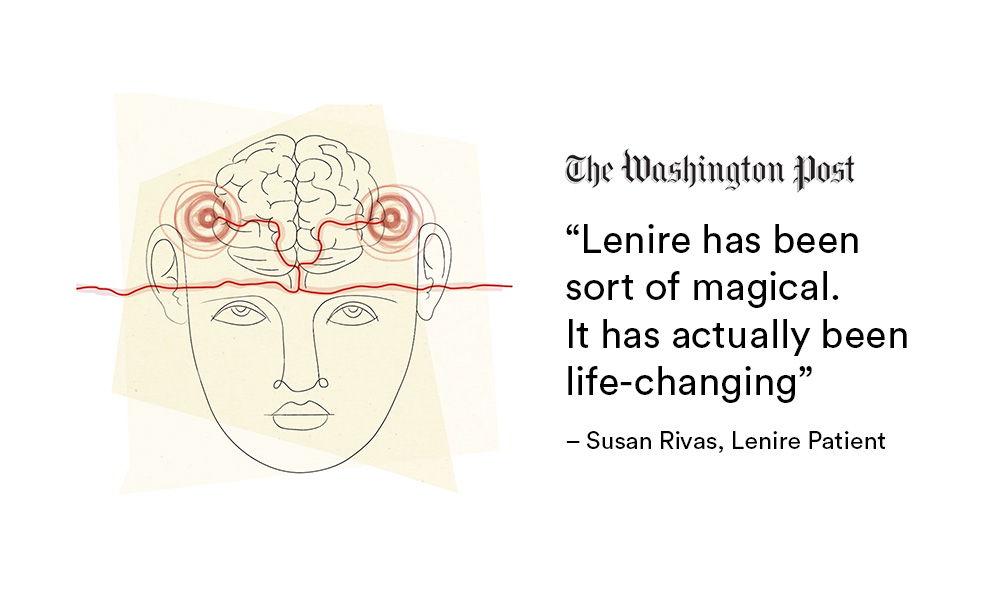Inspiring Lenire Patient Stories Media Coverage

Inspiring Lenire Patient Stories Media Coverage
Tinnitus, commonly known as ringing in the ears, affects an estimated 15% of the global adult population. This means more than 1 billion adults worldwide could be living with the condition. Tinnitus isn’t just ringing in the ears, the condition can manifest as buzzing, hissing, pulsing and many more sounds.
Despite the overwhelming prevalence of tinnitus, there are few treatment options for tinnitus patients. As a result of the condition being historically underserved, there were just as few patient success stories.
Until now.
Lenire was awarded FDA Approval in 2023 and has become the most in-demand tinnitus treatment device in the US. Since FDA Approval, major news media coverage of inspiring Lenire patient stories has been extensive. Outlets include The Washington Post, NPR, Bloomberg, and Fox News.
Lenire’s success is owed to the device having the largest evidence base in existence for a tinnitus treatment device. As well as this, Neuromod Devices established a network of leading hearing professionals around the world. This network of tinnitus experts ensure patients get the best possible care throughout their tinnitus treatment journey.
Below is a roundup of some of the inspiring Lenire patient stories in the media.

Inspiring Lenire Patient Stories in The Washington Post
The Washington Post wrote a deep dive feature on bimodal neuromodulation, tinnitus and the impact Lenire’s novel technology can have on people living with tinnitus. You can read the full article over on The Washington Post or read the patient success story excerpt below.
Lenire Patient Story Excerpt
Bojan Radojevic’s tinnitus sounded like a high-pitched ringing — as loud as a scream. The 56-year old in Chandler, Ariz., started experiencing tinnitus in March 2021 without any clear explanations.
The noise made it hard for Radojevic to sleep, work and eat. In a matter of months, he lost around 25 pounds. He cycled through standard and experimental treatments. Bojan tried white-noise machines to cover up the constant ringing. He wore hearing aids that played sounds like running water in his ears. The 56-year-old got counseling to help him get used to the sound.
He even tried ketamine therapy. Nothing worked.
“Lenire has been sort of magical. It has actually been life-changing” – Susan Rivas, Lenire Patient
Standard treatments didn’t work for Susan Rivas, 59, of Aurora, Colo., either. Her tinnitus started after she got sick with a bad flu in 2002 and got worse over time. For more than two decades, she has heard sounds like ringing, chirping and different pitched notes in her ear.
Eventually, she tried experimental treatments like hypnosis and took herbal supplements — all to no avail.
“You get to the point where you’d give up your right arm to get rid of the noise,” she said.
Radojevic and Rivas started using bimodal neuromodulation treatments through Lenire last year. They used the device twice a day for 30 minutes over the course of 12 weeks.
Both noticed improvements in their sleep after just a day and continue to use the devices regularly.
Radojevic said his tinnitus is “almost nonexistent.” Rivas said she can still hear the tinnitus, but it doesn’t bother her anymore.
“It’s been sort of magical. It’s actually been life-changing,” she said.

Lenire Patient Story on NPR’s Here and Now
Lenire patient Elliot Gerberg joined NPR’s Here and Now alongside Tobias and Battite Hearing and Balance Center Founder, and Lenire Provider, Dr. Brian Fligor.
In the NPR Here and Now interview, they talk about tinnitus, Lenire and their first hand experience using and providing the device respectively.
“It’s an effect where you get totally distracted from the tinnitus, and you actually start relaxing,” Gerberg says. “Soon, you don’t even hear the tinnitus. It’s there, but you’re just hearing the sounds from the headphones.”
You can listen to the interview using the media above or visiting NPR Here and Now’s website.
Michael McCreary Inspiring Patient Story – FOX5
Real estate manager and chronic tinnitus sufferer, Michael McCreary (68) appeared on Fox5 Atlanta to share his fascinating story about living with tinnitus and using Lenire to treat the condition.
Michael McCreary’s expert audiologist, Dr Melissa Wikoff of Peachtree Hearing in Atlanta also joined the Fox5 Medical Team to share her expertise on tinnitus and Lenire.
You can watch Michael and Dr. Wikoff’s interview with FOX5 in the video above but please be aware that this story features samples of tinnitus sounds. You can read the transcript of the interview below if you feel listening to the interview may call you a tinnitus fluctuation.
Michael McCreary – Living with Tinnitus
Michael McCreary has been living with tinnitus for more than 25 years but, in 2023, he finally found a device that is helping “tame his tinnitus.”
McCreary started to experience tinnitus after attending a Backstreet Boys concert in 1998. However, it was not the Backstreets Back singers that sparked his tinnitus. It was the audience of screaming girls baying for the boy band’s attention.
“We got there, everything was fine – the warm up was great – but the second the band came on stage… It was the thousands of screaming girls around me that was the problem and not the music.” said McCreary.
A few days later, McCreary started hearing a sharp and shrill ringing sound 24/7. Eventually, this tone morphed into a constant whooshing. This became the soundtrack to his life.
“Tinnitus is a sound that you perceive that nobody else can hear. It is a sound that is not coming from the environment, it is coming from inside your head. The number one cause is hearing loss” said Dr. Melissa Wikoff.
“I’ve been specialising in tinnitus for the past fifteen years and Lenire is the most powerful tool I have in my tinnitus toolbox.” continued Dr. Wikoff.
“Tinnitus doesn’t wake me up. It doesn’t keep me from going back to sleep. I can concentrate at work. I keep using it and continue to see progress.” said McCreary.
Michael McCreary visited Dr. Wikoff at Peachtree Hearing shortly after Lenire was granted FDA Approval in 2023. After a tinnitus assessment, Michael was prescribed the Lenire device and given a custom treatment plan.
Michael starts his day between 05:00 and 06:00 with his morning Lenire session. He sets up the device, starts his treatment and begins working on a crossword puzzle.
- Treatment Tip: Avoid screens such as phones, televisions and laptops during relaxing Lenire sessions. Reading, journaling and, of course, crossword puzzles are good treatment activities.
After beginning this routine at the start of October 2023, Michael began to notice the improvements by Thanksgiving. Now, after a number of months using the Lenire tinnitus treatment device, Michael has been sleeping better with improved concentration.
“Tinnitus doesn’t wake me up. It doesn’t keep me from going back to sleep. I can concentrate at work. I keep using it and continue to see progress.” said McCreary.

Lenire Patient Story in Bloomberg
Neuromod Devices Founding CEO, Dr. Ross O’Neill and Lenire Patient Dr. Richard Bistrong sat down with Bloomberg to discuss living with tinnitus and the impact Lenire can have. Read an excerpt below or read the full article here.
Bloomberg Lenire Patient Story Excerpt
Richard Bistrong started to notice the ringing in his ears in 2019. The high-pitched tone was loud, constant — and stressful. The worst times of the day were in the early morning and late evening. If he happened to wake up in the middle of the night, when there was nothing else to drown it out, it was especially bad. He tried medication, saw an audiologist and an inner ear medical specialist. Nothing worked.
“It was one of the worst things that ever happened to me in my life,” he says.
Tinnitus occurs when nerves in the ear become damaged, leaving gaps in hearing — specific frequencies people are unable to hear. The noise occurs because the brain is trying to fill those sensation gaps in, similar to what often happens in phantom limb pain, when people have lost an appendage, says Ross O’Neill, CEO of Neuromod Devices.
“Lenire has been a life-changer”
O’Neill’s company has taken an unusual approach to filling in that gap. Its device, called Lenire, takes a two-pronged path to training the brain to ignore the phantom tones — or at least pay less attention to them.
A stimulator placed on the tongue delivers electric stimuli that feel mildly effervescent. Meanwhile, headphones play swishing ocean sounds along with a series of beeping tones.
The combined effect of the two forms of stimulation, O’Neill says, is to train the brain out of its focus on the internally generated noise.
“We can tag those sounds and label them to be turned down,” he says.
Users wear the headphones and hold the stimulator in their mouth for an hour a day, usually in two sessions. Bistrong tried the device at the suggestion of his otologist. The feeling is meditative, Bistrong says, and ultimately pleasant.
For people like Bistrong, that doesn’t necessarily mean that the sound is gone. However, it’s far less imposing and incapacitating.
“The more I use the device, the better the outcome has been,” Bistrong says. “It has been a life-changer.”
More Inspiring Lenire Patient Stories
Breakthrough tinnitus treatment device, Lenire, has helped thousands of people get relief from tinnitus, so they can return to living life their way. You can see more patient stories by visiting Lenire Patient Stories.
If you, or someone you know, has tinnitus and is struggling to find the support they need – they can find a leading tinnitus care clinic in Ireland, the UK and the US by visiting www.lenire.com/find-a-clinic.



